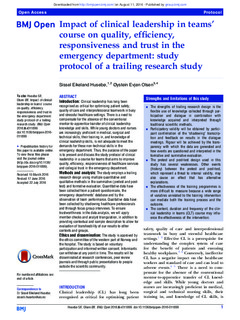| dc.contributor.author | Husebø, Sissel Eikeland | |
| dc.contributor.author | Olsen, Øystein Evjen | |
| dc.date.accessioned | 2016-08-11T08:24:38Z | |
| dc.date.available | 2016-08-11T08:24:38Z | |
| dc.date.issued | 2016-07 | |
| dc.identifier.citation | Eikeland, S.H.; Olsen, Ø.E. (2016) Impact of clinical leadership in teams’ course on quality, efficiency, responsiveness and trust in the emergency department: study protocol of a trailing research study. BMJ Open, 6(8) | nb_NO |
| dc.identifier.uri | http://hdl.handle.net/11250/2398732 | |
| dc.description | Funding This work was supported by Stavanger Acute Care Research Group
(SAR). This is an Open Access article distributed in accordance with
the Creative Commons Attribution Non Commercial (CC BY-NC 4.0) license,
which permits others to distribute, remix, adapt, build upon this work noncommercially,
and license their derivative works on different terms, provided
the original work is properly cited and the use is non-commercial. See: http://
creativecommons.org/licenses/by-nc/4.0/. The article was originally published in BMJ Open; 2016;6:e011899. doi:10.1136/bmjopen-2016-011899 | nb_NO |
| dc.description.abstract | Introduction: Clinical leadership has long been
recognised as critical for optimising patient safety,
quality of care and interprofessional teamwork in busy
and stressful healthcare settings. There is a need to
compensate for the absence of the conventional
mentor-to-apprentice transfer of clinical leadership
knowledge and skills. While young doctors and nurses
are increasingly proficient in medical, surgical and
technical skills, their training in, and knowledge of
clinical leadership skills, is not adequate to meet the
demands for these non-technical skills in the
emergency department. Thus, the purpose of the paper
is to present and discuss the study protocol of clinical
leadership in a course for teams that aims to improve
quality, efficiency, responsiveness of healthcare services
and collegial trust in the emergency department.
Methods and analysis: The study employs a trailing
research design using multiple quantitative and
qualitative methods in the summative (pretest and posttest)
and formative evaluation. Quantitative data have
been collected from a patient questionnaire, the
emergency departments’ database and by the
observation of team performance. Qualitative data have
been collected by shadowing healthcare professionals
and through focus group interviews. To ensure
trustworthiness in the data analysis, we will apply
member checks and analyst triangulation, in addition to
providing contextual and sample description to allow for
evaluation of transferability of our results to other
contexts and groups.
Ethics and dissemination: The study is approved by
the ethics committee of the western part of Norway and
the hospital. The study is based on voluntary
participation and informed written consent. Informants
can withdraw at any point in time. The results will be
disseminated at research conferences, peer review
journals and through public presentations to people
outside the scientific community. | nb_NO |
| dc.language.iso | eng | nb_NO |
| dc.publisher | BioMed Central | nb_NO |
| dc.rights | Navngivelse-Ikkekommersiell 3.0 Norge | * |
| dc.rights.uri | http://creativecommons.org/licenses/by-nc/3.0/no/ | * |
| dc.subject | clinical leadership | nb_NO |
| dc.subject | helsefag | nb_NO |
| dc.subject | ledelse | nb_NO |
| dc.subject | akuttmedisin | nb_NO |
| dc.subject | emergency department | nb_NO |
| dc.title | Impact of clinical leadership in teams’ course on quality, efficiency, responsiveness and trust in the emergency department: study protocol of a trailing research study | nb_NO |
| dc.type | Journal article | nb_NO |
| dc.type | Peer reviewed | nb_NO |
| dc.subject.nsi | VDP::Medical disciplines: 700::Health sciences: 800 | nb_NO |
| dc.source.volume | 6 | nb_NO |
| dc.source.journal | BMJ Open | nb_NO |
| dc.source.issue | 8 | nb_NO |
| dc.identifier.doi | 10.1136/bmjopen-2016-011899 | |

